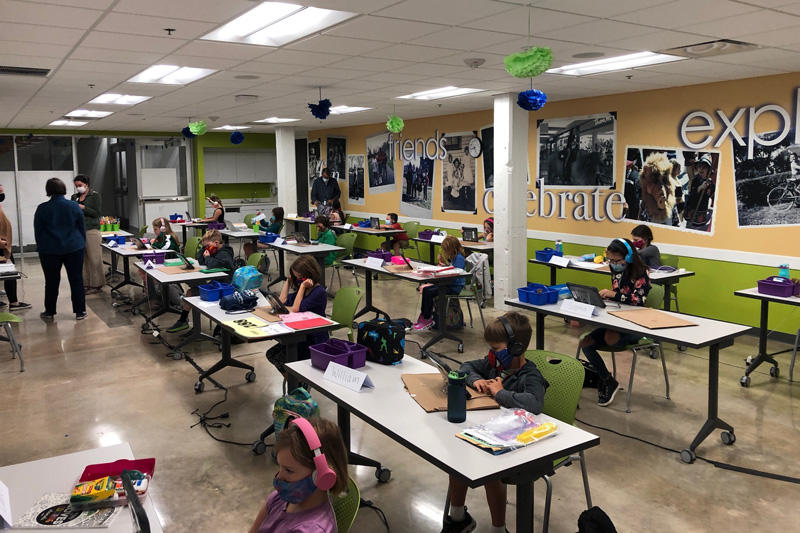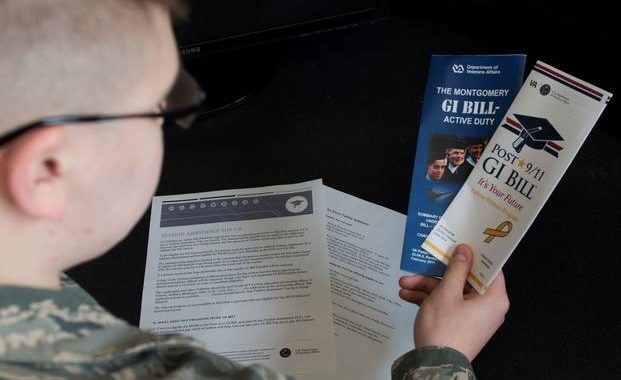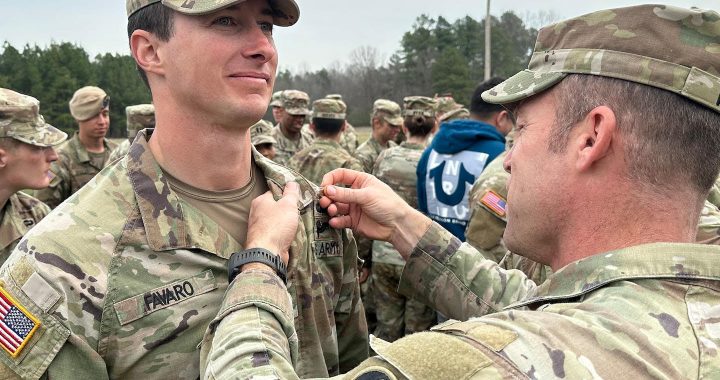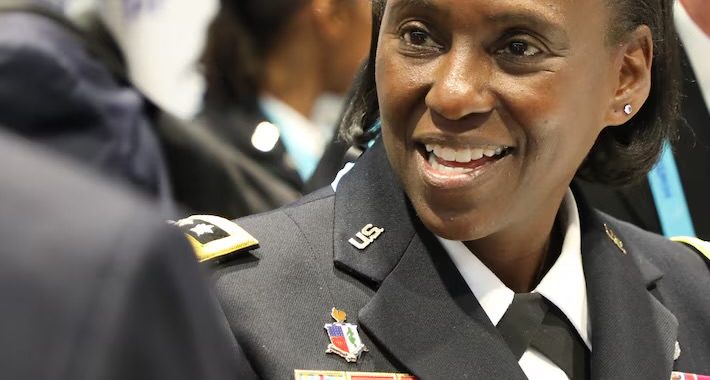Learning Hubs for Virtual Education Grow in Popularity in Northern Johnson County, but Traditional Childcare Providers Raise Concerns

With the start of an unprecedented school year that has tens of thousands of students across Johnson County learning remotely for at least a few days each week, many working families have started to look for educational alternatives for their children.
Shawnee Mission’s roughly 27,000 students are all learning remotely for the time being, while other public school districts in Johnson County have many students in hybrid learning mode, splitting time between home and school. As a result, some parents have begun forming “learning pods” with other parents to have their children learn in small groups at home. Meanwhile, some nonprofits, churches, entertainment companies and Johnson County itself, have all launched their own learning hubs in recent weeks to support kids and families still enrolled in traditional schools.
This story is not a comprehensive report of all available alternative learning options in northern Johnson County. Instead, we’ve identified a handful of approaches for remote learning support and also heard some counterpoints by local childcare providers with concerns about child safety and unfair competition.
Following the Shawnee Mission Board of Education’s decision last week to begin transitioning elementary students to in-person learning in October, some of these learning hubs are preparing for the fluctuation of enrollment numbers in their programs in the coming weeks.
COLONIAL CHURCH Y ACADEMY: ‘IT’S TAKING A VILLAGE TO BE ABLE TO DO THIS.’
Johnson County Park and Recreation District is offering remote learning support for students enrolled in local schools. Jill Leiker, wellness manager for JCPRD, said these learning hubs align with guidance from the Johnson County Department Health and Environment.
“We just feel like we have an opportunity to help our community and provide safe and impactful places for kids to do their learning,” Leiker said, noting that all JCPRD staff doing supervision have gone through background checks.
“It’s taking a village to be able to do this,” she added. “We made this commitment to the community to be able to help people and to be able to do these, no matter how long they last, which is a huge staff commitment but something that we know is necessary in our community.”
The YMCA of Greater Kansas City also revamped its after-school care programs and summer camps to offer full-day learning academies as remote learning support. Colonial Church in Prairie Village hosts one of these called Colonial Church Y Academy.
“I think they were ready to be with people again,” Perkins said. “That’s the problem, was they haven’t been with people since March.”Led by co-directors Shawn Mayberry and Jackie Perkins, the academy launched Sept. 8 and has 21 children currently enrolled. Both co-directors said the students have been “fantastic.”
Supervisors of learning pods aren’t necessarily teachers — some are, but many of them are simply employees of the company or nonprofit they run. While they aren’t trained to teach, parents may not be trained either.
“After last year, these kids are going to be behind,” Perkins said. “What we’re trying to offer is a safe option for the parents who can’t afford the really expensive learning pod, but it’s somewhere where the kid can go and they have a chance to do better than they would on their own.”
Mayberry and Perkins said all staff must complete background checks and go through extensive training each year. Citing the health risks of COVID-19, staff require parents to wait outside for drop-off and pick-up.
YMCA offers flexible scheduling as well as financial assistance for some families like the Vestal family in Overland Park.
Krisha Vestal, a single mother of four students who attend John Diemer Elementary in the Shawnee Mission district, said she’s grateful to have an affordable space for her children to learn while she works her full-time finance career.
She says she found out about Colonial Y by searching for local learning hubs on the Internet.
“I was at a loss as to how I, a single mother of four, was going to handle that while working full time from home,” Vestal said. “I feel lucky to have found this place because I don’t know what I would have done without it.”
Vestal said she made the best decision she could, considering her family’s mental health and educational well-being. She plans to keep bringing her children to the learning hub for as long as necessary, or until school opens back up.
“I feel like so many parents are just wondering if they’re doing the right thing,” Vestal said. “It’s your child, you know what’s best for them. Parents shouldn’t feel guilty by what they choose just because it’s something different from what other people are choosing.”
HARVEST RIDGE COVENANT CHURCH: ‘WE CAN … BE A BLESSING.’
Harvest Ridge Covenant Church in Shawnee also launched its learning space last week. Staff have found less interest than anticipated — three students are enrolled — but they’re prepared to host up to 53 students to be grouped in smaller learning pods. The church also offers flexible scheduling and financial assistance.
“After we’ve heard the need, the goal is that we can hopefully be a blessing to those who need a safe place for their students to learn,” said Tiffany Flanagan, co-pastor of the church.
Merle Dunn, a sixth grader at Lexington Trails Middle School in USD 232 in De Soto, spends some days at school each week and some days learning virutally at Harvest Ridge. He says remote learning is different, and school can be “complicated” trying to keep up with rules like hand-washing and wearing masks. But overall, things are going well so far.
“You can do more stuff faster on the computer, but you don’t get help that fast, because if you raise your hand, the teacher is going to come to you within the next five minutes,” Merle said. “But (now) you have to email, and they’ve got quite a few kids emailing, so it could take up to half an hour.”
Stephanie Dunn, Merle’s mother, said the Harvest Ridge’s program has been “incredible” for her family, who just moved to De Soto.
“It’s been a real solitary summer for him, so for him to be able to go anywhere is great,” Dunn said. “They’re very welcoming, and I feel like they’ve really worked hard to make it a good functioning space. He has enjoyed it and has been productive, so I think they’re doing a great job.”
Flanagan said staff are all required to go through background checks and child safety training. They’re also connecting students with tutors on specific subjects like math, science and language arts.
SKY ZONE OFFERING SKYSTUDY
Sky Zone, a trampoline park company with a location in Shawnee, extended its Sky Camp program (also called SkyStudy), which opened Sept. 1.
Mandy Carter, regional marketing manager for Sky Zone, said they offer flexible learning options for students. The party rooms become learning spaces, and the rest of the trampoline park is the venue for recess.
“As a parent myself — and a lot of our team members are parents — we realized during this time we need as many options as possible to consider because every family is in a different situation, whether it’s financially, scheduling wise, maybe kids aren’t having face to face opportunities,” Carter said. “The last thing that parents need is to have to make a choice that they weren’t satisfied with.”
Carter said staff are required to complete background checks, wear masks and complete cleaning regimens.
CHILDCARE PROVIDERS URGE SAFETY MEASURES, CONSISTENCY FOR LEARNING HUBS
Some daycare providers have raised concerns that learning hubs and other alternative learning spaces lack consistency and safety standards for children and families, and also create unfair competition for their businesses.
“Right now, families are in a situation where they don’t have adequate support for where to put their kids in this time of year,” said Emily Barnes, owner of Barnes Childcare in Olathe. “Knowing how hard my colleagues and I have worked in the last six months, it initially felt unfair that we would work so hard and here now this potential for unlicensed care… it could potentially take business away.”
Barnes, who is also advocacy chairperson for Child Care Provider Coalition of Kansas, a nonprofit supporting family childcare providers across the state, said she hasn’t personally lost business due to the learning hubs. Initially, she was also “very skeptical and concerned” with how quickly learning hubs emerged.
Beth Kirk, owner of Beth Kirk’s Daycare in Shawnee, echoed some of those concerns, primarily because learning hubs are not required to be licensed. Daycares like hers — which are capped at 12 children — must spend time and money to complete background checks and extensive training in order to be licensed.
Unlicensed learning pods, in her mind, have an unfair advantage by skipping those steps and could put children’s safety at risk.
“There’s so many different areas of training that we can take to better ourselves to provide a better environment for our families and the kids, but these other people, they don’t ever have to do a minute of training,” Kirk said. “It’s about keeping the kids safe.”
Kirk said she’s seen daycares take a hit nationwide, as families opt to keep their children home, or a family member tests positive or gets exposed and needs to quarantine for two weeks at a time.
“I can say I don’t know a daycare provider who hasn’t had a loss from this,” Kirk said, noting she lost about half of her business during the pandemic, although some of that business has returned.
Barnes said she wants to make sure parents know how to look for high-quality programs that ensure their children’s safety. For instance, she says, learning hubs should require background checks and put staff through training, and also follow industry guidance from the Johnson County Department of Health and Environment.
“I believe, truly that parents really are trying to do what it takes to take care of their families. Every family has thought about every option so much, and every provider who is providing care has weighed every single option,” Barnes said. “So I know, at the base of everything, you really truly have a situation where the majority of people are simply trying to make good things come out of what feels like a really impossible situation.”




